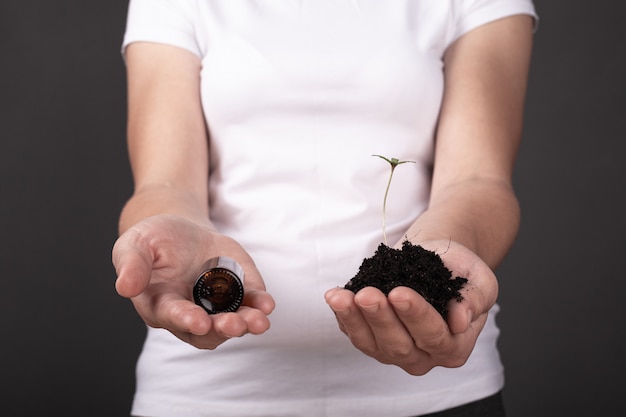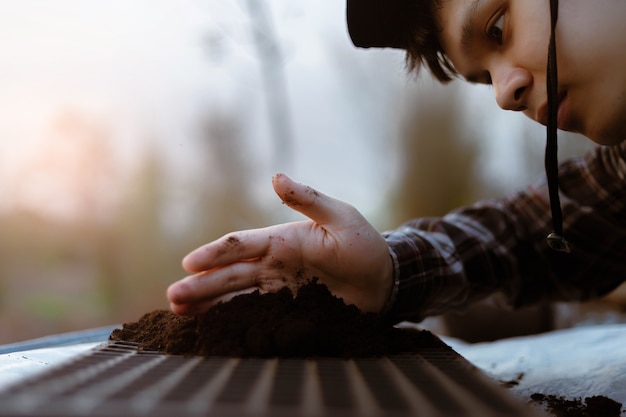Hi, I’m Emma, a self-proclaimed gardening enthusiast who has spent countless weekends digging around my backyard, chasing the dream of greener lawns and more vibrant veggies. But as I’ve learned over the years, the key to thriving plants isn’t just water or sunshine—the soil quality they grow in. Understanding soil health benefits has changed how I care for my garden and made me appreciate how vital healthy soil is for the world.
If you’ve ever wondered why your plants struggle to grow or why that garden bed won’t produce as you hoped, chances are the answer lies beneath your feet. Let me walk you through what soil health means, why it matters, and how improving it can transform everything from your backyard to the planet.
What Does “Soil Health” Actually Mean?

Soil health refers to the condition of soil—its structure, nutrients, and ability to support life. Healthy soil contains beneficial microorganisms, organic matter, and essential nutrients that plants need to grow strong and resilient. Think of it as the immune system of your garden: the healthier the soil, the better it can support plants, animals, and even humans.
To put it simply, soil health isn’t just about dirt. It’s about the living, breathing ecosystem that exists underground. From earthworms to fungi, every tiny organism plays a role in creating balance.
The Key Soil Health Benefits You Should Know
- Better Plant Growth
Healthy soil is like a balanced diet for your plants. It provides essential nutrients like nitrogen, phosphorus, and potassium, critical for plant development. When soil health is strong:
- Plants grow faster and stronger.
- Crops produce higher yields.
- Flowers and foliage appear more vibrant and healthy.
I’ve noticed firsthand how vegetables from well-nourished soil grow better and taste richer. If you’ve ever bitten into a homegrown tomato compared to a store-bought one, you know what I’m talking about!
- Improved Water Retention
Have you ever watered your garden only to watch the water pool and run off? Poor soil can’t hold moisture well, so plants can’t absorb the water they need. Healthy soil, on the other hand, acts like a sponge:
- It absorbs and retains water more effectively.
- Your garden requires less watering, saving both time and water bills.
- Plants stay hydrated longer during dry spells.
In Australia’s dry climate, improving water retention is especially valuable. A well-maintained soil can make all the difference during a scorching summer.
- Reduces Erosion
Soil erosion is a common problem, especially in areas with heavy rains or strong winds. Healthy soil is held together by organic matter and plant roots, making it more stable. This means:
- Less soil gets washed away or blown off your land.
- The ground retains valuable nutrients instead of losing them to Erosion.
- Your garden stays fertile and productive.
It’s incredible how adding compost and organic mulch can help hold everything together.
- Boosts Biodiversity
Did you know that a teaspoon of healthy soil contains millions of microorganisms? It’s like a bustling underground city! When soil is in good shape:
- Earthworms, fungi, and bacteria thrive.
- These organisms break down organic matter into nutrients plants can use.
- A diverse ecosystem supports healthier plants and gardens.
Biodiversity in the soil also benefits local wildlife, including birds and insects. It’s all connected in ways you might not see but will notice over time.
- Carbon Sequestration
Here’s a benefit beyond your backyard: healthy soil helps combat climate change by storing carbon. Soil rich in organic matter captures carbon dioxide from the air and locks it underground, reducing greenhouse gases and improving soil fertility.
This soil health benefit is empowering for someone who cares about the environment. Simple composting can contribute to a healthier planet—one garden at a time.
How to Improve Soil Health in Your Garden
Now that you know the benefits, let’s talk about simple steps to improve soil health in your garden. Trust me, you don’t need fancy tools or endless free time. Here’s what I’ve done to nurture my soil:
- Add Organic Matter
- Compost, aged manure, and mulch are my go-to soil boosters. They provide nutrients, improve soil structure, and encourage earthworms and microbes.
- Avoid Chemical Fertilisers
- While chemical fertilizers can give plants a quick boost, they can harm the soil in the long run. Instead, use organic alternatives like compost tea or seaweed fertilizers.
- Plant Cover Crops
- Cover crops, like clover or legumes, protect the soil from Erosion and, when they decompose, add nutrients back into it.
- Rotate Your Plants
- Rotating crops each season prevents nutrient depletion and reduces pests and diseases. It’s a simple trick that works wonders.
- Minimise Tilling
- Over-tilling can break down the soil structure and harm its ecosystem. I opt for no-dig methods to keep the soil healthy and undisturbed whenever possible.
The Bigger Picture: Healthy Soil, Healthy Planet
The soil health benefits extend far beyond our gardens. Healthy soil is vital in food production, clean water, and climate stability. It’s easy to take soil for granted, but life as we know it wouldn’t exist without it.
Whether you’re a home gardener like me, a farmer, or someone who cares about the environment, investing in soil health is one of the simplest yet most impactful things you can do. It’s good for your plants, your wallet, and the planet.
Share Your Soil Story

Now that you know soil health is importance, I’d love to hear your thoughts. Do you have any tips for improving soil health in your garden? Have you noticed how healthier soil benefits your plants or veggies? Drop your stories in the comments—I’m always eager to learn from fellow garden lovers!
If you find this guide helpful, share it with a friend or fellow gardener who might need some soil inspiration. Let’s work together to care for the soil that cares for us.
